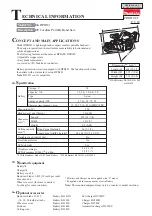
3
English
c)
When battery pack is not in use, keep it away from other
metal objects, like paper clips, coins, keys, nails, screws,
or other small metal objects, that can make a connection
from one terminal to another.
Shorting the battery terminals
together may cause burns or a fire.
d)
Under abusive conditions, liquid may be ejected from
the battery; avoid contact. If contact accidentally occurs,
flush with water. If liquid contacts eyes, additionally seek
medical help.
Liquid ejected from the battery may cause
irritation or burns.
6) SERVICE
a)
Have your power tool serviced by a qualified repair
person using only identical replacement parts.
This will
ensure that the safety of the power tool is maintained.
Additional Safety Rules – Portable Band
Saws
• Hold power tool by insulated gripping surfaces when
performing an operation where the cutting accessory may
contact hidden wiring.
Cutting accessories contacting a “live”
wire may make exposed metal parts of the power tool “live” and
could give the operator an electric shock.
•
Keep hands away from cutting area and blade.
•
Always make sure the portable band saw is clean before
using.
•
Always cease operation at once if you notice any abnormality
whatsoever.
• Always be sure all components are mounted properly and
securely before using tool.
• Always handle the band saw blade with care when mounting
or removing it.
• Always keep your hands out of the line of the band saw
blade.
• Always wait until the motor has reached full speed before
starting a cut.
• Always keep handles dry, clean, and free of oil and grease.
Hold the tool firmly when in use.
•
Always be alert at all times, especially during repetitive,
monotonous operations.
Always be sure of position of your
hands relative to the blade.
•
Never remove work stop.
• Stay clear of end pieces that may fall after cutting off.
They
may be hot, sharp and/or heavy. Serious personal injury may result.
•
Air vents often cover moving parts and should be avoided.
Loose clothes, jewelry or long hair can be caught in moving parts.
WARNING: ALWAYS
use safety glasses. Everyday eyeglasses are
NOT safety glasses. Also use face or dust mask if cutting operation is
dusty. ALWAYS WEAR CERTIFIED SAFETY EQUIPMENT:
• ANSI Z87.1 eye protection (CAN/CSA Z94.3),
• ANSI S12.6 (S3.19) hearing protection,
• NIOSH/OSHA/MSHA respiratory protection.
WARNING:
Some dust created by power sanding, sawing,
grinding, drilling, and other construction activities contains chemicals
known to the State of California to cause cancer, birth defects or other
reproductive harm. Some examples of these chemicals are:
• lead from lead-based paints,
• crystalline silica from bricks and cement and other masonry
products, and
• arsenic and chromium from chemically-treated lumber.
Your risk from these exposures varies, depending on how often you do
this type of work. To reduce your exposure to these chemicals: work
in a well ventilated area, and work with approved safety equipment,
Summary of Contents for DCS374
Page 2: ......






































